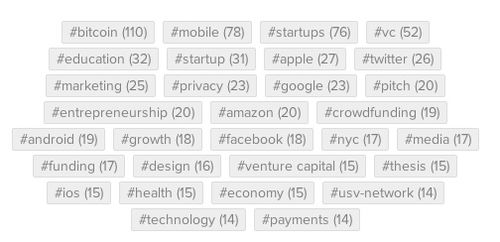Hour Of Code
This is CS Ed Week and this year we are celebrating it with an Hour Of Code. The idea is to get every student to spend an hour this week writing code.
If you want to do this with your kids (at home or in school), here are some resources to try:
The Codecademy Hour of Code iPhone app - download this on an iPhone, iPad, or iPod Touch and learn the basics of coding in an hour. As many of you know, Codecademy is a USV portfolio company and millions of people have used Codecademy to start learning to code.
Code.org – Code.org has built tutorials for teachers who want to do an hour of code in their classrooms. Code.org is a non-profit dedicated to bringing CS to schools all around the country and they are leading the Hour Of Code effort nationwide.
Other resources – there are a host of resources out there, like Scratch, Scalable Game Design, CodeHS, Globaloria, and Tynker that you can use to teach the hour of code to your students.
In other CS Ed news, Obama endorsed CS Ed and the Hour Of Code in this video yesterday.
And the city of Chicago announced that they will integrate CS Ed broadly in their schools so that every student gets the opportunity to learn coding skills.
And last but not least, in NYC, Chancellor Wolcott announced a $1mm program to train over 100 teachers in the code.org curriculcum. This program is a partnership between CSNYC, Code.org, NYC EDC, and NYC DOE, all of which participated in the funding. If you want to help support this effort, we are raising money for CSNYC so that we can fund more programs like this in NYC. Our crowdrise fundraising page is here.
Yesterday was a big day for CS Ed. Everyone should celebrate CS Ed week by doing an hour of code with your kids. This is an important effort that is now getting the attention it deserves.

